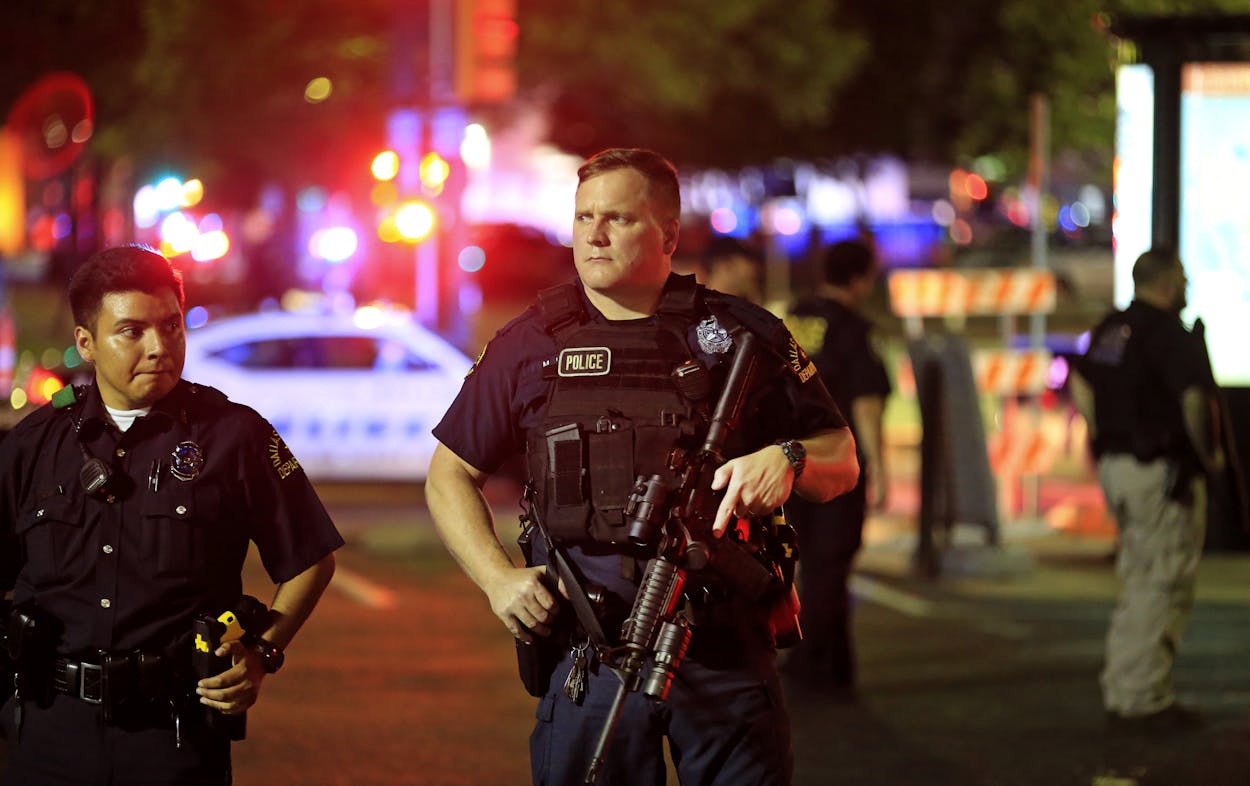Last night chaos broke out in Dallas, after someone opened fire at a Black Lives Matter protest. The result of his spree, which concluded in the early hours of this morning, was tragic. It was the deadliest day for American police officers since the September 11th terrorist attacks. Five officers were killed–four from Dallas PD, and one from DART. Seven more had been wounded, as had two protesters. The shooter, who has also died, has been identified as Micah Xavier Johnson; several suspects remain in police custody.
More details can be found at the Dallas Morning News, among other local outlets. And my colleague Dan Solomon has a review of what we know so far about the shooting. But the story is, of course, still developing, and so it would be unwise to start drawing conclusions or assigning blame, especially considering the context: Yesterday’s Black Lives Matter protests, in Dallas and other cities across the nation, were organized in response to the deaths of Alton Sterling and Philando Castile, both of whom were black, and both of whom were shot and killed by police for seemingly no reason at all.
Some Republican leaders have explicitly warned against politicizing the shootings in Dallas. “There will be a temptation to let anger harden our divisions. Let’s not let that happen,” said Paul Ryan, the speaker of the U.S. House, in a speech today. Greg Abbott, the governor of Texas, similarly called for unity in an open letter today: “To come together—that would be the greatest rebuke to those who seek to tear us apart.”
Others, though, have rushed to assign blame, and the most high-profile hasty accusations have come from Dan Patrick. “I do blame former Black Lives Matter protests,” said the lieutenant governor, in an interview on Fox News earlier today, arguing that the movement foments hatred of police. Further, he added, it’s full of phonies: “All those protesters last night, they turned around and ran the other way expecting the men and women in blue to protect them. What hypocrites!”
Many on the right are leveling similar accusations against Black Lives Matter, and it may be the case that Johnson, who was black, considered himself a supporter of the movement. Over the course of the standoff that culminated in his death, according to Dallas Police Chief David O. Brown, he told police negotiators that he “wanted to kill white people, especially white officers,” among other things. But that doesn’t mean such accusations against the movement itself are justified, and looking at the evidence, I don’t think they are.
Empirically and analytically, it seems flatly wrong to blame the shootings in Dallas on the Black Lives Matter movement. The protest itself was peaceful; even Patrick conceded that much, hence his reference to “former” events. And the movement’s overarching purpose is to end police killings, not to kill police. You can find supporters on Twitter saying otherwise, if you’re motivated to do so. Or you could refer to the goals Black Lives Matter lays out in its platform, or the vast majority of its leaders and supporters, who condemned the violence in Dallas. You could also note that, again, even Patrick conceded that point, when he noted that many of the protesters in Dallas had turned to the police for protection after the shooter opened fire. This wasn’t hypocritical; as Jordan Rudner explains, at the Texas Tribune, the Dallas PD and the Black Lives Matter movement have had notably good relations over the past several years. And the supporters who gathered last night were protesting police brutality in response to two brutal police killings, not the existence of law enforcement or the nature of all cops. Black Lives Matter supporters, in other words, aren’t the ones arguing, reductively, that Dallas is intractably divided between two warring teams, the “black” and the “blue.”
It’s possible, I suppose, to argue that the Black Lives Matter movement writ large is contributing to a national climate of hatred toward law enforcement that may manifest itself violently. Such arguments tend to be dubious, though. And based on what we know thus far, those on the right who have rushed to make such claims are ignoring the one silver lining of this sorrowful situation. As Chief Brown has said, it’s unclear what motivated the shooter, and the reasons he cited can never qualify as grounds for murder. But it was clear, even amid the chaos in Dallas, that these officers were motivated by a genuine commitment to serve and protect the public—including the protesters they welcomed yesterday afternoon and whom five officers would die defending later that night.







